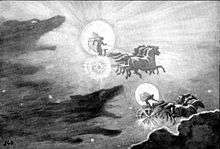Muspelheim
In Norse mythology, Muspelheim (Old Norse: Múspellsheimr), also called Muspell (Old Norse: Múspell), is a realm of fire. This realm is one of the Nine Worlds, ruled by Surtr with his consort Sinmara in some accounts. The denizens of Muspelheim were usually referred to as the Eldjötnar (or Eldthursar, Eldþursar—"fire giants") in Norse tradition, though they were also identified by other epithets in Eddic poetry, such as the Múspellssynir (or Múspellsmegir—"sons of Muspell"; altn. Múspellmegir, Múspellsynir) and the Rjúfendr (from rjúfa—"to break, tear asunder", Destroyers of Doomsday).[1][2] Both of these terms sometimes described an entirely separate mythological species that dwelled alongside or in place of the eldjötnar within this fiery realm.
Muspelheim was the first elemental world to emanate from the primordial void of potentiality Ginnungagap; and the land to the North, Niflheim was the second. The two mixed and gave rise to Ymir.
According to the Ragnarök prophecies in Snorri Sturluson's Gylfaginning, the first part of his Prose Edda, the sons of Muspell will break the Bifröst bridge, signaling the end of times:
In the midst of this clash and din the heavens are rent in twain, and the sons of Muspell come riding through the opening. Surtr rides first, and before him and after him flames burning fire. He has a very good sword, which shines brighter than the sun. As they ride over Bifrost it breaks to pieces, as has before been stated. The sons of Muspel direct their course to the plain which is called Vigrid.... The sons of Muspel have there effulgent bands alone by themselves.
The etymology of "Muspelheim" is uncertain, but may come from Mund-spilli, "world-destroyers", "wreck of the world".[3][4]
See also
| Wikisource has original text related to this article: |
Notes
- ↑ "Court poetry, vol. I. ", pg. 183; "Court poetry, vol. II", pg. 472, s.v. "Demon World-Destroyers"
- ↑ Germanic Lexicon Project: http://lexicon.ff.cuni.cz/html/oi_cleasbyvigfusson/b0501.html
- ↑ Tilton, Theodore (1897). The complete poetical works of Theodore Tilton in one volume: with a preface on ballad-making and an appendix on old Norse myths & fables. London: T. Fisher Unwin. p. 705. Retrieved 2013-01-05.
- ↑ Vigfússon, Guðbrandur; Frederick York Powell (1883). Corpus poeticum boreale: Court poetry, vol. II. Oxford: Clarendon Press. p. 471. Retrieved 2013-01-05.
